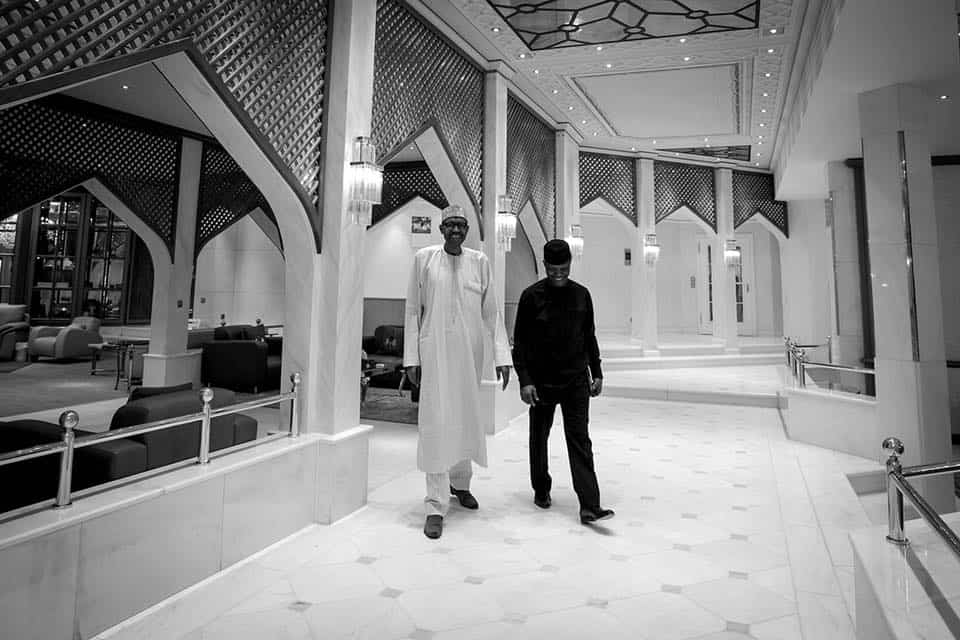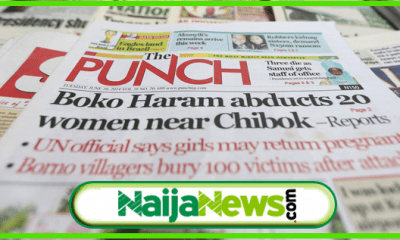Politics
Buhari, Osinbajo’s Aides Share N2.48bn In Four Years

No fewer than 127 aides are serving President Muhammadu Buhari and Vice-President Yemi Osinbajo.
Of the 127 aides, four are a little bit above the rank of ministers; 18 are aides that are paid for by donor agencies; 56 are aides of varied ranks whose emoluments could not be determined while 49 are on the rank of special advisers whose emoluments are captured by the Revenue Mobilisation Allocation and Fiscal Commission (RMAFC).
The 49 aides whose emoluments are captured by the RMAFC are entitled to N2.48bn within a four-year tenure.
Some of the aides are attached to the President’s wife, Aisha; Vice-President’s wife, Dolapo; Chief of Staff to the President and some ministers such as the Attorney-General of the Federation and Minister of Information and Culture.
According to a government document obtained by The Punch, the aides are classified into five categories: top aides, Special Advisers, Senior Special Assistants, Special Assistants and Personal Assistants.
The document shows that four political appointees fall into the category of top aides. There are seven Special Advisers; 51 Senior Special Assistants; 47 Special Assistants and 18 Personal Assistants.
Out of the 51 SSAs, however, nine of them are donor-funded. Among the 47 SAs, nine are also donor-funded. This means that 18 of the aides draw their salaries from donor agencies that give grants to the government.
The President, it is believed, will retain or re-appoint most of the political appointees after the dissolution of his cabinet ahead of his inauguration for a second term.
The four appointees listed as top aides are the Secretary to the Government of the Federation, Boss Mustapha; Chief of Staff to the President, Abba Kyari; Head of the Civil Service of the Federation, Mrs Winifred Oyo-Ita; and the Deputy Chief of Staff to the President (Office of Vice-President, Adeola Ipaye.
In the Special Advisers category are the Special Adviser to the President (Media and Publicity, Mr Femi Adesina; National Security Adviser, Maj. Gen. Babagana Mungono (retd.); Special Adviser to the President/Coordinator, Amnesty Programme, Prof Charles Dokubo; and Special Adviser to the President (Political Matters) Office of the Vice-President, Femi Ojudu.
Others are the Special Adviser to the President (Economic Matters) Office of the Vice-President, Dr Adeyemi Dipeolu; Special Adviser to the President (Social Investments) Office of the Vice-President, Mrs Maryam Uwais; and Special Adviser to the President on Planning, Mr Tijjani Abdullahi.
In the SSA category are the SSA to the President on (Media and Publicity), Garba Shehu; SSA to the President (Media and Publicity), Office of the Vice-President, Laolu Akande; SSA to the President (Household and Social Events), Mr Sarki Abba; SSA to the President (Documentation), Office of the Vice-President, Mr Sesan Adeboyejo; and SSA to the President (ICT and Logistics), Office of the Vice-President, Mr Lanre Osibona.
Others in that category are SSA to the President (Administration), Office of the Vice-President; SSA to the President (Economic Matters), Office of the Vice-President; Chief Personal Physician to the Vice-President; Personal Physician to the Wife of the Vice-President; SSA to the President (Power), Office of the Vice-President; SSA to the President (Internally Displaced Persons), Office of the Vice-President; Personal Physician to the Wife of the President; and the Personal Physician to the President.
The Special Assistants category, the designer of the national flag, Pa Taiwo Akinkunmi, is named SA to the President for Life.
Others in that category are SA to the President (Housekeeping), SA to the President (Special Duties), Office of the Wife of the Vice-President; SA to the President (Privatisation), Office of the Vice-President; SA to the President (Household and Social Events), Office of the Wife of the Vice-President; and SA to the President (Catering Services).
Others are SA to the President (Youth and Students Affairs); SA to the President on Digital/New Media; SA to the President on Physically Challenged people; SA to the President (Domestic Matters) to the Wife of the President; SA to the President (Communication Projects); SA to the President (Strategic Communications), Office of the Vice-President; SA to the President (Documentation), Office of the Vice-President; and SA to the President (Visual Communication), Office of the Vice-President, among others.
In the Personal Assistants category are Personal Assistant to the President (General Duties); PA to the President (Hausa/Facebook); PA to the President (State Photographer); PA to the President (Presidential Photographer; five PAs to the President (Domestic Affairs); and two PAs to the President (Special Duties).
Others are PA to the President (TV media); PA to the President (Broadcast Media); PA to the President (Social Events); PA to the President (Social Media); PA to the President (Political) Office of the Vice-President; PA to the President (Videography) Office of the Vice-President; and PA to the President (Teleprompter Operations) Office of the Vice President.
A breakdown of the 127 presidential aides are as follows: four top aides, seven special advisers, 51 senior special assistants, 47 special assistants and 18 personal assistants.
Findings at the Revenue Mobilisation, Allocation and Fiscal Commission showed that the four top aides are remunerated as ministers.
Each of them is also entitled to the privileges accorded ministers although in practical terms, ministers report to them.
The template for the remuneration of political office holders prepared by RMAFC covered the earnings of special advisers and did not specify what senior special assistants, senior assistants and personal assistants earn.
However, a source at the RMAFC told The Punch that the difference between a special adviser and a senior special assistant is just in nomenclature. This means that they are placed on the same salary scale.
Each special adviser is entitled to an annual basic salary of ₦1,942,875; motor vehicle fuel and maintenance of ₦1,457,156.25; special assistant (full value paid for by the government); personal assistant allowance of N485,718.75; domestic staff allowance of ₦1,457,156.25; entertainment allowance of N874,293.75; utilities allowance of N582,862.50 and newspapers/periodicals allowance of N291,493.75.
These allowances come up to a total of ₦7, 091,493.75 per annum or N590, 957.81 a month.
The total salary for the 49 aides amounts to N347, 483,193.75 per annum. For tenure of four years, they collect N1.39bn.
However, there are other irregular allowances. These include an accommodation allowance of ₦3, 885,750 per annum.
The 49 aides collect N190.4m per annum for accommodation. This amounts to N761.61m for tenure of four years.
A furniture allowance of ₦5, 828,625 is paid once in Four-year tenure. For the 49 aides, this amounts to N285.6m for the tenure. Leave allowance of N194, 287.50 is paid once a year. For the 49 aides, this amounts to N9.52m per annum or N38.08m per tenure.
Other allowances include tour allowance of N25, 000 per night for local trip and $800 per night for foreign trips. Medical treatment is fully provided and not monetised.
For the salaries and allowances that are quantified, the 49 aides get an annualised total of N620m or N2.48bn in four years.
This excludes a severance allowance of ₦5, 828,625 per person at the end of the tenure.
The emoluments of the 47 special assistants and 18 personal assistants could not be ascertained because their entitlements were not contained in RMAFC’s template.
The other category of aides (nine senior special assistants and nine special assistants) – 18 in all – who are funded by donor agencies do not earn uniform remunerations although their salaries are generally higher than what the regular aides get.
Usually, what they earn depends on qualifications, experience, ability to negotiate and the donor agency that is picking the bill. While some of these aides are paid in foreign currencies, other are paid the naira equivalent. American donor agencies are said to pay lesser than British agencies, for instance. Some of the aides are rated per hour while others are rated and paid on a monthly basis.
Although the aides paid by donor agencies do not draw their salaries from the national treasury, their pay is part of what foreign government and agencies give to Nigeria as foreign grants. Instead of giving government cash grants, they prefer to pay for consultants and for expertise needed in government.
The aides serving the Presidency that are funded by donor agencies include Senior Special Assistant on Power; SSA on Trade and Investment; SSA on Monitoring and Evaluation; SSA on Internally Displaced Persons and four SSAs on Economic Recovery and Growth Plan.
Others include Special Assistant on Legal Matters; SA on National Economic Council, SA on Internally Displaced Persons; SA on Power Privatisation; SA on Innovation and Entrepreneurship; SA on Bureau of Public Enterprises and SA on Social Investments.






